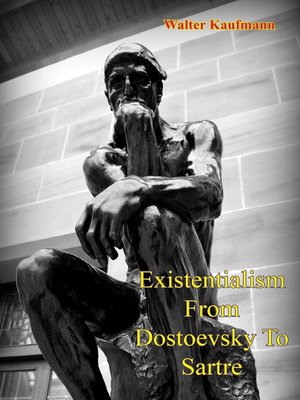
Sign up to save your library
With an OverDrive account, you can save your favorite libraries for at-a-glance information about availability. Find out more about OverDrive accounts.
Find this title in Libby, the library reading app by OverDrive.



Search for a digital library with this title
Title found at these libraries:
| Loading... |
What is Existentialism? It is perhaps the most misunderstood of modern philosophic positions—misunderstood by reason of its broad popularity and general unfamiliarity with its origins, representatives, and principles.
Existential thinking does not originate with Jean Paul Sartre. It has prior religious, literary, and philosophic origins. In its narrowest formulation it is a metaphysical doctrine, arguing as it does that any definition of man's essence must follow, not precede, an estimation of his existence. In Heidegger, it affords a view of Being in its totality; in Kierkegaard an approach to that inwardness indispensable to authentic religious experience; for Dostoevsky, Kafka, and Rilke the existential situation bears the stamp of modern man's alienation, uprootedness, and absurdity; to Sartre it has vast ethical and political implications.
Walter Kaufmann, author of Nietzsche, is eminently qualified to present and interpret the insights of existentialism as they occur and are deepened by the major thinkers who express them.
In every case complete selections or entire works have been employed: The Wall, Existentialism, and the complete chapter on "Self-Deception" from L'être et le Néant by Sartre; two lectures from Jaspers' book Reason and Existenz; original translations of On My Philosophy by Jaspers and The Way Back into the Ground of Metaphysics by Heidegger. There is, as well, material from Dostoevsky, Kierkegaard, Nietzsche, Rilke, and Camus.
Existential thinking does not originate with Jean Paul Sartre. It has prior religious, literary, and philosophic origins. In its narrowest formulation it is a metaphysical doctrine, arguing as it does that any definition of man's essence must follow, not precede, an estimation of his existence. In Heidegger, it affords a view of Being in its totality; in Kierkegaard an approach to that inwardness indispensable to authentic religious experience; for Dostoevsky, Kafka, and Rilke the existential situation bears the stamp of modern man's alienation, uprootedness, and absurdity; to Sartre it has vast ethical and political implications.
Walter Kaufmann, author of Nietzsche, is eminently qualified to present and interpret the insights of existentialism as they occur and are deepened by the major thinkers who express them.
In every case complete selections or entire works have been employed: The Wall, Existentialism, and the complete chapter on "Self-Deception" from L'être et le Néant by Sartre; two lectures from Jaspers' book Reason and Existenz; original translations of On My Philosophy by Jaspers and The Way Back into the Ground of Metaphysics by Heidegger. There is, as well, material from Dostoevsky, Kierkegaard, Nietzsche, Rilke, and Camus.






